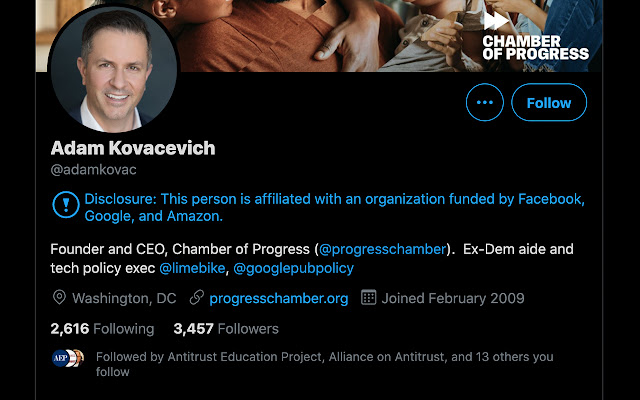As Congress prepares to debate a series of new antitrust bills, the Big Tech Funding browser extension encourages lawmakers to be mindful of Big Tech’s financial connections by disclosing its funding of experts and groups on both sides of the aisle.
When US lawmakers return to Washington, DC this month one of the big ticket items on their ever growing to-do list will be antitrust reform. Earlier this summer, a handful of antitrust bills were introduced in the US House of Representatives. Already, companies that might be affected by the proposed legislation have been lobbying lawmakers, asking them to read the fine print and to consider the impact the bills might have on US-based companies and their ability to compete internationally.
However, it isn’t just paid lobbyists who are campaigning on behalf of Big Tech. Think tanks and other groups that receive funding from companies like Google, Facebook, and Amazon also tend to weigh in on these issues, sometimes without disclosing their connections. A Big Tech Funding browser extension rolled out in July is hoping to put an end to that by appending disclosures to Tweets authored by organizations that receive Big Tech funding, as well as users with ties to such organizations.

The extension is the brainchild of the American Principles Project (APP), a conservative think tank focused on protecting American families from “the increasingly hostile progressive attacks on parents and children.” Big Tech came under APP’s scrutiny in the lead-up to the 2020 election, when “powerful Big Tech companies like Facebook, Twitter, and Google waged an all-out attack on our democracy by suppressing news stories, banning users, blocking advertisements, and manipulating algorithms to promote one political party over another,” Jon Schweppe, APP’s director of policy and government affairs, said in a press release.
“We saw coming down the pipe this shift on the left, away from what I would say are liberal values of free speech and free expression, defending your rights to say whatever, even if they disagree, towards a more authoritarian view of removing what they would deem to be misinformation,” Schweppe explained in an interview with ProMarket. “That was what motivated us to get into the tech space. Unfortunately, I think we were proven to be right. We thought that the companies might start doing this at scale in a much more aggressive way, especially with the 2020 election.”
When the APP took a closer look at Big Tech’s influence, Schweppe often heard from people working for other groups on the right—“mainly free market groups”— that there is “not much we can do” about Big Tech’s growing power.
“‘These are private companies. They can do whatever they want. Section 230 is the greatest thing since sliced bread.’ And we thought it was interesting,” he said. As Schweppe talked to more people on both sides of the political aisle about this, one thing kept coming up: the flow of Big Tech money throughout DC, including to groups on the right.
“Even back in 2019, it was kind of a well-known thing that Google and Facebook and the Koch network, and all these different sources were funding pro-Big Tech interest groups on the right and left,” he said. “It’s one of those things in DC, like there’s a lot of corporate money going around and that sort of thing. I think it was something discussed in private, but not necessarily exposed for the world.”
The launch of the Big Tech Funding extension is supposed to change that, by allowing anyone to install the extension and view the data. Users can also help build out the database of organizations and experts receiving funding from these companies by emailing tips and data to bigtechfunding@protonmail.com.
“The companies have found a really smart way to lobby by going through these interest groups to make it look like it’s just about ideological free market principles and not regulatory capture and I think it is really important to expose that,” said Schweppe, who is a registered lobbyist himself. Among the topics he focuses on is Section 230 reform and, most recently, he has been lobbying in favor of the antitrust bills introduced in the US House of Representatives.
“I have a lot of disagreements with Democrats, but one of the things I do tend to like about them is that they aren’t shocked about corporate influence. The Republicans kind of are. I heard from a couple of people: ‘How is this legal? Don’t they have to disclose that they are lobbying?’ Well, this isn’t technically lobbying. I think people view it as kind of a loophole. And I also think, on the Republican side, the base is very much wanting something to be done about Big Tech. The legislators and the think tanks haven’t totally caught up to that yet. They are getting there, but they haven’t caught up to where that energy in the grassroots is.”
“I have a lot of disagreements with Democrats, but one of the things I do tend to like about them is that they aren’t shocked about corporate influence. The Republicans kind of are.”
A poll conducted earlier this month by Data for Progress found that 79 percent of the 1,187 likely Americans voters surveyed supported increasing scrutiny on tech mergers. Two-thirds of the respondents also said that Big Tech companies shouldn’t be allowed to acquire small firms. A survey conducted by Vox and Data for Progress in January found that Republicans were more likely than Democrats to support breaking up Big Tech and to say that Big Tech’s economic power is a problem. The topic has also come up during the 2021 Conservative Political Action Conference (CPAC).
Just as the antitrust bills were being introduced in the House, Schweppe sent a letter to Republican lawmakers urging them to do research on who gets funding from Big Tech before meeting with any groups on “issues related to Section 230, antitrust, common carrier regulations, and political appointments to relevant regulatory bodies, including the Department of Justice, Federal Trade Commission, Federal Election Commission, and Federal Communications Commission.” He wrote:
“While it is prudent to hear arguments about public policy made in good faith, it is foolish to ignore the presence of private financial interests. Make no mistake, a meeting with an organization that takes notable sums of money from Google is no different than a meeting with a member of Google’s Public Policy team. In far too many cases, the agenda of such organizations will be wholly compromised, singularly reflecting the agenda of their Big Tech patrons.”
According to Schweppe, the letter was well received and was “repeatedly” followed up by another request: “Can you name and shame?” That was when Schweppe and APP decided to “put our money where our mouth is.” For a while now, they have been compiling a database of organizations that receive Big Tech funding. They hired a developer and with his help launched a Google Chrome extension called Big Tech Funding, which is supposed to serve as a transparency tool by adding disclosures under tweets sent Twitter users associated with organizations that receive money from Big Tech. Now, two months since its launch, the extension has more than a thousand downloads.
Its purpose is not to accuse anyone of being a “shill” for Big Tech, but rather it’s to encourage transparency about funding, said Schweppe.
“It’s a fair question to ask of anyone, including me, and of [APP], our funding. We’re in a very fortunate spot, a unique organization, in that respect,” he explained during an interview, which took place in August 2021. “Last year, more than 99 percent of our funding came from individuals and foundations. This year, as of now, we haven’t received corporate funding. We are open to it, but we just haven’t. I think we’re in a situation where we can actually make these arguments, because we are not really beholden to anyone.”
Still, because APP is “culturally conservative”, as Schweppe puts it, the roll out of the extension was met with some skepticism and surprise. Schweppe himself was surprised that something like this didn’t already exist.
“I’m a little surprised it didn’t come from the left, because I think the left is a lot better than the right on pursuing corporate funding transparency,” he said. “But it’s not necessarily surprising, because this didn’t make me any friends. It’s not going to do me any favors if I try to go work at certain places in DC. I think that potential reputational damage probably has prevented other groups from doing something similar.”
Schweppe hopes that the extension inspires other groups to do the same, maybe for industries other than Big Tech like oil or pharma so that transparency about funding becomes more common. Already, he thinks there are signs of progress, such as reporters including disclosures about funding for their sources. “One of the big goals we had with it—and I think we’re actually seeing some success on it is—when journalists are quoting policy people from Big-Tech-funded think tanks, I think they need to disclose that they get Big Tech funding. And we have actually seen growth in that.”






